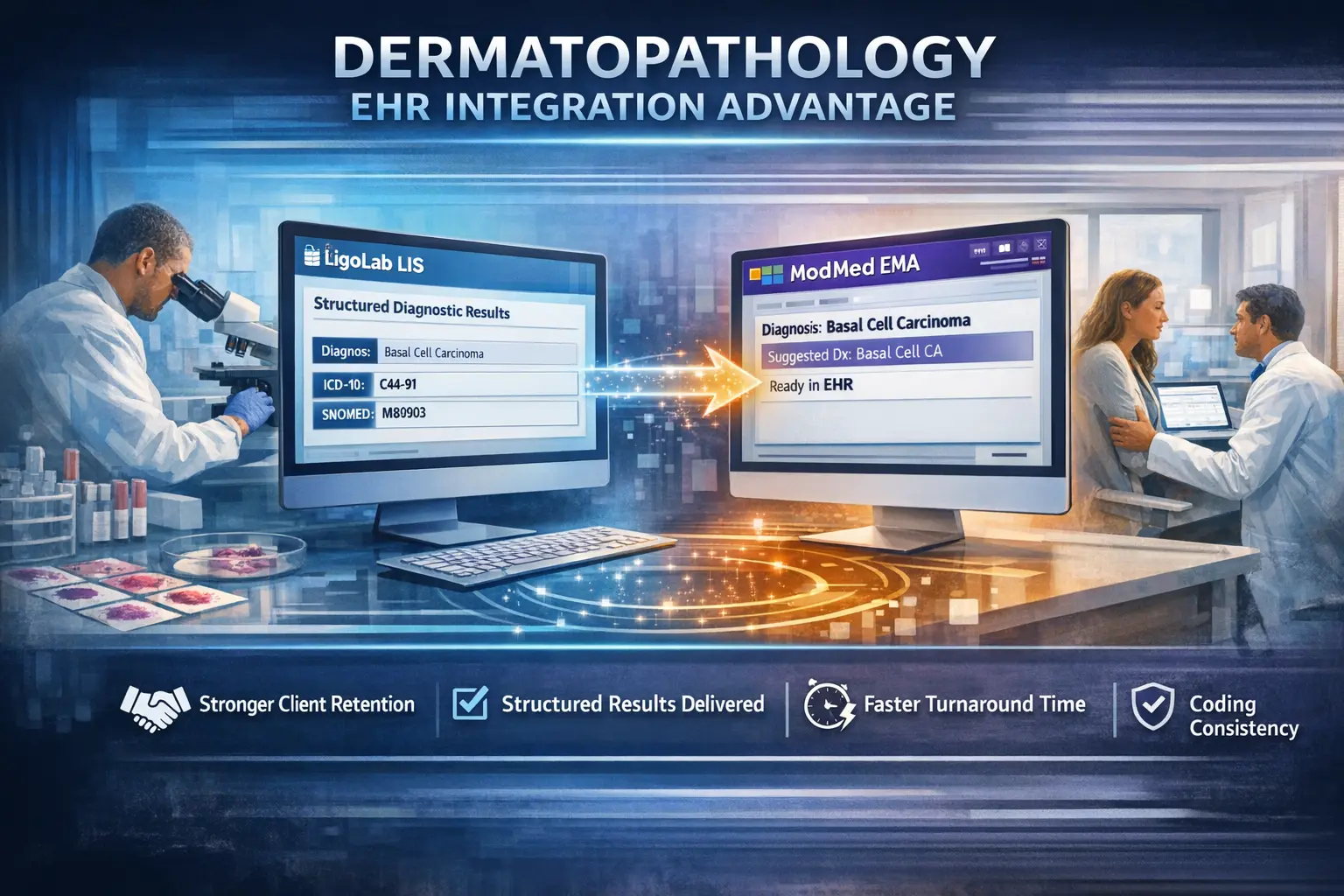Blog
LigoLab Glossary of Terms
January 21, 2026
Modern clinical laboratories and pathology practices operate at the intersection of diagnostics, informatics, automation, and healthcare finance. From understanding what a LIS laboratory information system actually does, to distinguishing it from a laboratory information management system (LIMS vs LIS), to grasping concepts like laboratory revenue cycle management (lab RCM), sample tracking software, molecular lab testing software, and point-of-care testing, today’s lab leaders must navigate an increasingly complex vocabulary.
This guide defines the most important laboratory, healthcare IT, and revenue integrity terms shaping contemporary clinical laboratory management and pathology lab management, while highlighting how advanced laboratory software systems, such as LigoLab’s all-in-one LIS system platform with advanced and embedded laboratory billing functionality, unify these concepts into a single, future-ready lab information system ecosystem.
Key Healthcare and Laboratory Informatics Terms Every Lab Leader Should Know
What is a LIS Laboratory Information System?
A laboratory information system is a specialized clinical and/or pathology software platform that helps personnel manage the full lifecycle of lab diagnostics. This includes capturing, processing, storing, and retrieving laboratory data across every stage of testing.
Modern clinical and pathology LIS systems, such as the LigoLab platform, serve as centralized data warehouses for all medical lab cases. They support advanced functionality, including reporting, digital image acquisition, direct microscope integration, specimen labeling, electronic case sign-out, quality control, integration with prior test results, auto-reflex testing, and more.
Discover More: Laboratory Information Systems Are Not Commodities!
What is a Lab Information Management System (LIMS Lab Management Software)?
A lab information management system (LIMS) is similar to a laboratory information system in that it helps organizations manage samples and associated data to improve operational efficiency. However, a LIMS lab management software is primarily designed for non-medical laboratory environments, such as research, food and beverage, chemical, and pharmaceutical labs.
A laboratory information management system software focuses on tracking sample data, experiments, laboratory workflows, and instruments to optimize productivity in research and industrial settings rather than supporting clinical diagnostics and patient care workflows.
Discover More: Laboratory Information Systems (LIS vs LIMS) for Data Management
What is Laboratory Revenue Cycle Management (Lab RCM)?
Laboratory revenue cycle management (lab RCM), also known as laboratory billing, is the financial process medical laboratories use to manage all administrative and clinical activities associated with patient service and client revenue.
It consists of a series of tightly coordinated steps that must be performed accurately and on time for a laboratory to be reimbursed for the services it provides. With the right lab billing strategy and advanced laboratory billing solutions, labs can optimize financial performance, ensure regulatory compliance, reduce denials, and maintain high levels of patient satisfaction.
Discover More: Reduce Denials and Stop Revenue Leakage With Integrated Laboratory Billing Management
What is Sample Tracking Software?
Sample tracking software refers to the lab sample management system that governs how a patient’s specimen is labeled, tracked, and moved through the testing process before final diagnostic results are delivered to a physician.
For example, the LigoLab platform provides error-free specimen tracking with complete traceability for every sample, real-time awareness of each specimen’s workflow status, and built-in controls to prevent mislabeling and processing errors.
Get Insight: How Specimen Tracking Software Improves Efficiency and Reduces the Chance for Diagnostic Errors
What is a Reference Laboratory?
A reference laboratory is typically a private, commercial testing facility that performs high-volume routine and specialty diagnostic testing using a laboratory information system.
Most reference lab testing is performed after referrals from physician offices, hospitals, and other healthcare facilities such as nursing homes. While hospitals aim to conduct as much testing as possible in-house, reference labs are often used for specialized or esoteric tests that require advanced equipment and expertise and are ordered only occasionally.
What is a Molecular Laboratory?
A molecular laboratory performs diagnostic testing that combines traditional laboratory techniques with the precision of molecular biology.
Using a molecular LIS system, these laboratories analyze human, viral, and microbial genomes, their genes, and the products they encode. Molecular diagnostics has transformed how clinical and public health laboratories detect disease, monitor outbreaks, and guide precision medicine.
Discover More: How Molecular Test Orders Are Accessioned in a Lab With LigoLab’s LIS System
How Do Medical Laboratories Organize Their Testing Menus?
Medical laboratories organize their testing menus as structured catalogs of the diagnostic services they offer to physicians, hospitals, employers, and patients. These menus are far more than simple test lists; they are operational, clinical, and financial frameworks that drive how orders are placed, specimens are processed, results are reported, and claims are billed.
In modern labs, testing menus are built and governed inside a laboratory information system (LIS) and are tightly linked to workflow logic, quality controls, and laboratory revenue cycle management.
What is Laboratory Management Software?
Laboratory management software is a broad category of digital systems designed to help laboratories operate more efficiently, accurately, and compliantly by managing their clinical, operational, and administrative workflows.
In medical and diagnostic environments, laboratory management software most often takes the form of a laboratory information system (LIS), a specialized platform built to support clinical testing, specimen tracking, result reporting, quality control, and laboratory billing.
In short, laboratory management software is the digital backbone of modern clinical laboratory management and pathology lab management.
What is Middleware?
Middleware is a type of software that sits between two or more systems and enables them to exchange data, communicate, and work together. It acts as a translator, traffic controller, and message broker, receiving information from one application, transforming it into the required format, and delivering it to another.
In healthcare and laboratory environments, middleware is most commonly used to connect instruments, analyzers, electronic health records (EHRs), laboratory information systems (LIS), and lab billing platforms that were not originally designed to work together.
What Are API Services for Laboratory Data Management?
API services for laboratory data management are software interfaces that allow different systems to securely exchange laboratory data in real time using standardized, programmatic connections.
API stands for Application Programming Interface. In simple terms, APIs let one application “talk to” another without manual file transfers, batch exports, or fragile point-to-point interfaces.
In clinical and diagnostic environments, API services are increasingly used to connect:
- Laboratory information systems (LIS software)
- Electronic health records (EHRs)
- Provider portals
- Billing and lab revenue cycle management platforms
- Digital pathology systems
- Direct-to-consumer lab testing portals
- Analytics and data warehouses
They form the backbone of modern, interoperable laboratory data ecosystems.
What Are Cloud-Based LIMS and LIS Systems?
A cloud-based laboratory information management system (LIMS) and laboratory information system are laboratory software platforms that are hosted and delivered over the internet rather than installed and maintained on local servers inside a laboratory or organization.
Instead of running in an on-premise data center, these systems operate in secure cloud environments (such as AWS, Azure, or Google Cloud) and are accessed through web browsers or secure client applications.
They provide the same core functionality as traditional systems, such as sample tracking, workflow management, result reporting, and data storage, but with far greater scalability, flexibility, and lower infrastructure burden.
What is LIS System and LIMS Integration?
LIS system and LIMS integration refers to the process of connecting a LIS system or a laboratory information management system with other software systems so that laboratory data can flow automatically between platforms without manual re-entry, file transfers, or duplicate workflows.
In simple terms, LIS/LIMS integration allows a LIS/LIMS to “talk to” the rest of an organization’s digital ecosystem.
It is most commonly used to connect with:
- Laboratory instruments and analyzers
- Enterprise systems (ERP, MES, QMS)
- Electronic health records (EHRs)
- Data warehouses and analytics tools
- Lab billing and finance systems
- Client, provider, or partner portals
What is a Disruptive Technology in Healthcare?
A disruptive technology is a new product, service, or business model that creates a new market or dramatically improves how work is done. Over time, disruptive technologies displace older approaches and reshape entire industries.
A strong example is TestDirectly, the direct-to-consumer lab testing portal developed by LigoLab. It replaces paper forms with a fully digital workflow that streamlines specimen collection, processing, reporting, and lab billing. The TestDirectly platform creates direct-to-consumer labs by removing bottlenecks, expanding patient access to testing, and improving turnaround times.
Discover More: Highlighting the Versatility of the TestDirectly Direct-to-Consumer Lab Testing Portal
What is Point-of-Care Testing (POCT)?
Point-of-care testing (POCT) refers to diagnostic testing performed at or near the patient’s location rather than in a centralized laboratory.
What Does a POCT Test For?
POCT enables rapid, reliable test results that support faster and more informed clinical decision-making.
Common examples of POCT devices include blood glucose monitors and pregnancy tests. These devices are typically smaller, easier to use, and designed for use in physician offices, urgent care centers, and bedside environments.
What is Rapid Point-of-Care Testing?
Rapid point-of-care tests deliver results within minutes.
They are frequently used to detect current or past infections, such as SARS-CoV-2 (COVID-19), in settings like physician offices, pharmacies, and urgent care facilities, enabling immediate clinical action.
What is Revenue Integrity (RI)?
Revenue integrity (RI) refers to the use of ethical business practices and sound policies to achieve three critical goals:
- Operational efficiency
- Regulatory compliance
- Optimal earned reimbursement
What is Revenue Integrity in Healthcare?
In healthcare, the purpose of RI is to prevent revenue leakage and compliance risks by establishing effective, efficient, and repeatable processes across the continuum of patient care.
Revenue integrity is supported by accurate documentation and disciplined financial practices that can withstand audits and regulatory scrutiny.
What is Structured Data in Healthcare?
Structured data is information organized into defined fields within a schema, with each field serving a specific purpose.
Examples of structured healthcare data include patient demographics, laboratory values, financial records, customer contact information, and laboratory billing codes. Structured data enables analytics, automation, interoperability, and regulatory reporting.
What is Practice Management Software?
Practice management software (PM software) is designed to help medical offices of all sizes operate more efficiently.
Small and medium-sized practices commonly use PM software to manage daily financial and administrative tasks such as scheduling, lab billing, and insurance processing. Some PM systems also integrate with electronic health records (EHRs).
Discover More: What Is Practice Management Software, Anyway?
What is the Role of EHRs in Supporting Population Health?
Electronic health records (EHRs) integrate with laboratory information systems and support population health by providing structured clinical data that tracks disease prevalence, functional status, and patient well-being across communities.
By enabling standardized data collection and secure sharing across healthcare organizations, EHRs improve quality measurement, public health surveillance, prevention programs, and long-term health outcomes.







